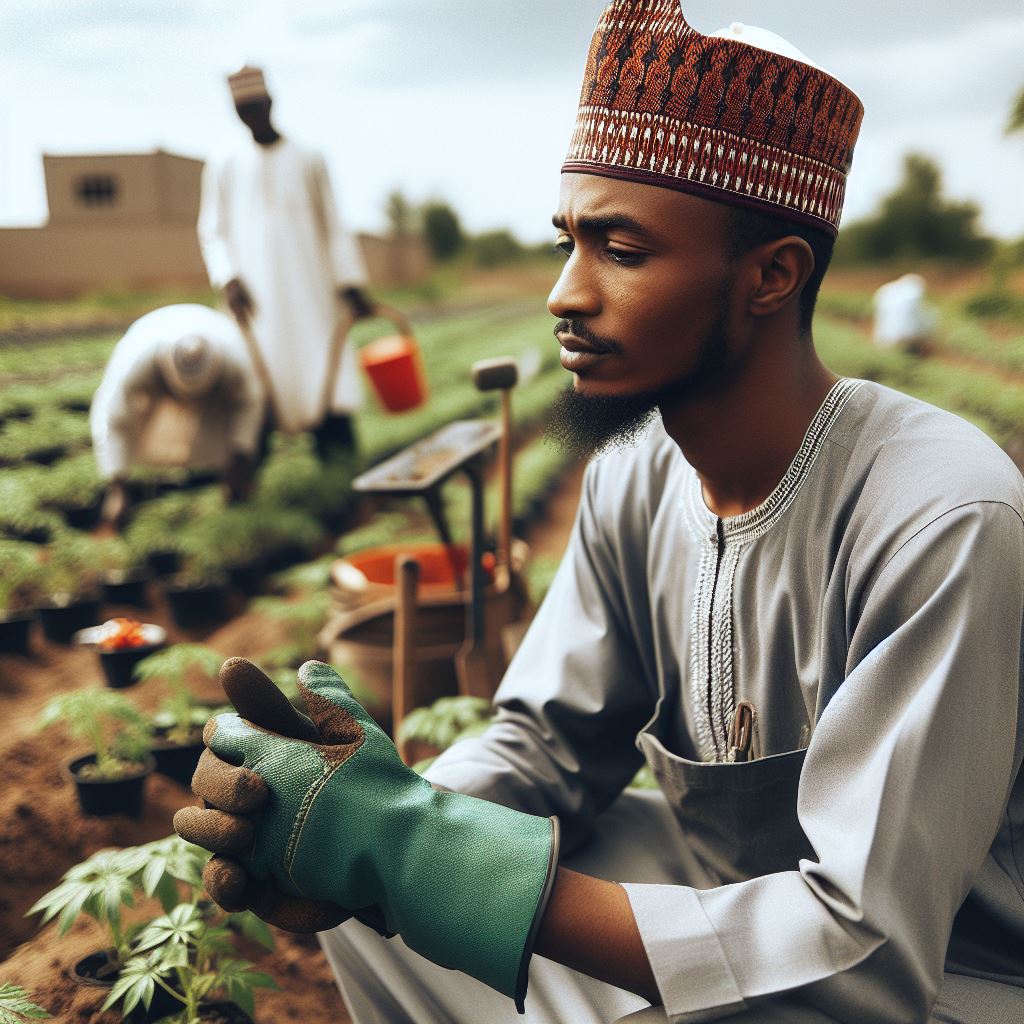Introduction
The significance of Nigeria’s agricultural science curriculum cannot be overstated. It serves as the bedrock for sustainable development, food security, and economic growth.
By equipping students with practical knowledge, it cultivates a new generation of agri-entrepreneurs and experts.
However, despite its importance, disparities exist between Nigeria’s agricultural science curriculum and global benchmarks.
This blog aims to dissect and compare Nigeria’s agricultural science education against international standards.
Nigeria’s agricultural science curriculum plays a pivotal role in shaping the nation’s agricultural sector.
It’s designed to impart knowledge about crop cultivation, animal husbandry, soil science, and agribusiness.
This curriculum strives to instill in students the skills necessary for agricultural productivity and innovation.
Yet, in the global landscape, variations emerge. International standards often emphasize interdisciplinary approaches, incorporating technology, sustainability, and modern agricultural practices.
Comparatively, Nigeria’s curriculum might lack certain elements crucial for addressing contemporary agricultural challenges.
Through this blog series, we’ll explore key facets of Nigeria’s agricultural science curriculum.
We’ll examine its strengths and identify potential areas for improvement in alignment with global benchmarks.
By highlighting both the positives and the gaps, we aim to offer insights for enhancing Nigeria’s agricultural education framework.
By analyzing global best practices and comparing them with Nigeria’s curriculum, we can pinpoint opportunities for refinement.
This comparative analysis isn’t about discrediting Nigeria’s efforts but about leveraging global standards to elevate agricultural education in the country.
In subsequent sections, we’ll delve deeper into specific components—curriculum structure, teaching methodologies, technological integration, and practical applicability.
The goal is to foster a dialogue that promotes advancements in Nigeria’s agricultural education, ultimately contributing to a more robust and globally competitive curriculum.
Join us on this enlightening journey as we navigate through the intricacies of Nigeria’s agricultural science curriculum and explore avenues for its evolution towards international parity.
Overview of Nigeria’s Agricultural Science Curriculum
Overview of the current agric science curriculum in Nigeria
Nigeria’s agricultural science curriculum plays a vital role in equipping students with the necessary knowledge and skills in the field of agriculture.
The curriculum aims to provide a comprehensive understanding of agricultural practices, techniques, and principles.
Objectives, content, and structure of the curriculum
The objectives of Nigeria’s agricultural science curriculum encompass both theoretical knowledge and practical application.
Students are expected to acquire a deep understanding of agricultural processes and techniques, as well as develop critical thinking, problem-solving, and analytical skills.
The content of the curriculum covers a wide range of topics, including crop production, animal husbandry, soil science, agricultural economics, agribusiness management, and agricultural technology.
It also includes elements of entrepreneurship and sustainable farming practices.
The structure of the curriculum is designed to ensure a balanced approach to teaching agricultural science.
It incorporates classroom lectures, laboratory experiments, field trips, and practical training to enhance student learning.
The curriculum emphasizes hands-on experiences that allow students to apply their theoretical knowledge in real-world scenarios.
Challenges and limitations faced by the curriculum
However, Nigeria’s agricultural science curriculum faces several challenges and limitations.
One major challenge is the lack of updated and relevant teaching materials and resources.
Many schools struggle to provide students with the necessary textbooks, laboratory equipment, and farm facilities, which hinders their practical learning experience.
Furthermore, the curriculum often neglects emerging trends and innovations in the field of agriculture.
With the rapid advancements in technology and the need for sustainable farming practices, the curriculum should integrate cutting-edge techniques and practices to prepare students for the evolving agricultural landscape.
Another limitation of the curriculum is the limited focus on entrepreneurship and agribusiness.
While agriculture plays a significant role in Nigeria’s economy, the curriculum does not adequately equip students with the necessary entrepreneurial and business skills to thrive in the sector.
This limits their ability to create innovative solutions and contribute to the growth of the agricultural industry.
Additionally, the curriculum does not fully address the socio-cultural and environmental aspects of agriculture.
It fails to emphasize the importance of sustainable farming practices, conservation of natural resources, and the impact of agriculture on local communities.
This limits students’ understanding of the broader implications of their agricultural practices.
In essence, Nigeria’s agricultural science curriculum provides a solid foundation for students to develop their understanding of agriculture.
However, there is a need for continuous improvement and updates to address the challenges and limitations faced by the curriculum.
By incorporating relevant and innovative teaching materials, emphasizing entrepreneurship and agribusiness, and addressing socio-cultural and environmental aspects, the curriculum can better prepare students for the dynamic field of agriculture.
Transform Your Career with Expert Guidance
Get personalized mentorship consulting that’s tailored to your unique path. Our expert advice is actionable and exclusive.
Get StartedRead: Agricultural Science: Career Prospects in Nigeria
Comparison with Global Standards
When examining the global standards for agricultural science curriculum, it is important to reflect on Nigeria’s curriculum as well.
By comparing the two, we can determine the key similarities and differences between them.
Similarities and Differences
Upon careful analysis, it becomes evident that Nigeria’s curriculum shares some similarities with the global standards for agricultural science education.
Both emphasize the importance of practical knowledge and hands-on learning.
However, there are also significant differences between Nigeria’s curriculum and the global standards.
One key dissimilarity is the focus on specific local agriculture practices in Nigeria, whereas the global standards tend to have a broader perspective.
Alignment with Global Standards
Despite these differences, Nigeria’s curriculum does align with certain aspects of the global standards.
For example, both emphasize the need for students to understand sustainable agricultural practices and the importance of environmental stewardship.
Moreover, both Nigeria’s curriculum and the global standards recognize the critical role of technology in modern agriculture.
They emphasize the use of innovative tools and techniques to maximize agricultural productivity.
Falling Short of Global Standards
However, there are areas where Nigeria’s curriculum falls short of the global standards for agricultural science education.
One such area is the level of emphasis placed on research and innovation.
The global standards prioritize research-based learning and encourage students to think critically and develop innovative solutions to agricultural challenges.
Nigeria’s curriculum needs to incorporate more research-oriented modules to bridge this gap.
Furthermore, the global standards often stress the importance of interdisciplinary approaches in agricultural science education.
Unfortunately, Nigeria’s curriculum tends to be more siloed and focuses solely on agriculture, neglecting other related fields.
When comparing Nigeria’s agricultural science curriculum with the global standards, it is clear that while there are similarities, there are also significant differences.
Nigeria’s curriculum aligns in certain areas but falls short in others.
It is crucial for Nigeria’s curriculum developers and educators to continue working towards a more comprehensive and globally aligned curriculum.
By embracing research, innovation, and interdisciplinary approaches, Nigeria can strive to meet the global standards for agricultural science education and ensure the development of well-rounded and skilled agricultural professionals.
Read: Top Universities in Nigeria for Agricultural Science Studies

Importance of Aligning with Global Standards
Significance of aligning Nigeria’s agric science curriculum with global standards
Aligning Nigeria’s agricultural science curriculum with global standards is vital for the progress and development of the nation in various aspects.
By adopting international benchmarks, Nigeria can ensure that its agricultural science education meets the highest standards and prepares students for success in a globalized world.
Potential benefits of this alignment for students, teachers, and the agriculture sector
One of the key benefits of aligning Nigeria’s agricultural science curriculum with global standards is the improvement in the quality of education received by students.
By following international best practices and incorporating cutting-edge content, students will gain a more comprehensive understanding of the subject matter.
Furthermore, aligning with global standards can also enhance the skills and knowledge of teachers.
By exposing them to the latest agricultural science practices and methodologies, teachers can improve their instructional approaches and deliver more effective lessons to their students.
The agriculture sector in Nigeria stands to benefit greatly from aligning its curriculum with global standards.
By ensuring that students are equipped with the skills and knowledge demanded in the international job market, Nigeria can enhance its competitiveness in the global agricultural industry.
How it can enhance international competitiveness and collaboration
Alignment with global standards also presents opportunities for international collaboration.
Students who are educated in a curriculum that aligns with global standards will be better prepared to engage in partnerships and collaborations with institutions and individuals from around the world.
In addition, aligning with global standards can improve the reputation of Nigeria’s agricultural science education system.
This is particularly important for attracting foreign investments and partnerships, as stakeholders will be more confident in the quality and relevance of Nigeria’s agricultural workforce.
Moreover, alignment with global standards can promote innovation and foster the development of sustainable agricultural practices in Nigeria.
By incorporating global best practices, students and professionals can gain insights into alternative approaches and solutions to agricultural challenges.
Furthermore, aligning Nigeria’s agricultural science curriculum with global standards can facilitate the transfer of knowledge and technology.
This transfer is crucial for addressing the country’s agricultural development needs and reducing the reliance on outdated or inefficient practices.
Lastly, alignment with global standards can contribute to the overall advancement and modernization of Nigeria’s agricultural sector.
By equipping students and professionals with the necessary skills and knowledge, Nigeria can position itself as a leader in the agricultural industry and drive economic growth.
In fact, aligning Nigeria’s agricultural science curriculum with global standards is imperative for the country’s progress.
The benefits of this alignment extend to students, teachers, and the agricultural sector, with improved education quality, enhanced international competitiveness, increased collaboration opportunities, and the promotion of innovation and sustainable practices.
By embracing global standards, Nigeria can position itself as a frontrunner in the global agricultural industry.
Read: Agricultural Extension: Enhancing Rural Development in Nigeria
Challenges and Recommendations
Challenges Faced in Aligning Nigeria’s Agric Science Curriculum with Global Standards
- Limited funding and resources to update and align the curriculum in Nigeria.
- Lack of collaboration and communication between policymakers, educators, and industry experts.
- Outdated teaching methods and materials that do not reflect global best practices.
- Resistance to change and reluctance to incorporate new concepts and technologies.
Possible Reasons for the Gaps and Limitations
- Inadequate training and professional development opportunities for teachers.
- Inefficient curriculum evaluation processes and a lack of continuous improvement measures.
- Limited exposure to international agricultural practices and advancements.
- Inconsistent implementation of policies and standards across different educational institutions.
Recommendations to Bridge the Gaps and Improve the Curriculum
- Increase funding and allocate resources to facilitate curriculum updates and revisions.
- Develop a comprehensive framework for collaboration and communication among stakeholders.
- Provide regular training and professional development opportunities for agric science teachers.
- Establish partnerships with international organizations and universities to exchange knowledge and expertise.
Strategies for Incorporating Global Best Practices in the Curriculum
- Introduce project-based learning methods to encourage practical application of knowledge.
- Include case studies and real-world examples from different countries to illustrate global best practices.
- Incorporate emerging technologies and innovations in the agricultural sector into the curriculum.
- Promote experiential learning opportunities, such as field trips and internships, to expose students to global agricultural practices.
In short, aligning Nigeria’s agric science curriculum with global standards faces several challenges.
Limited funding, inadequate training, and resistance to change hinder progress.
However, by implementing the recommended strategies and fostering collaboration, Nigeria can bridge the gaps, improve the curriculum, and incorporate global best practices for the benefit of the agricultural sector and future generations.
Read: Empowering Nigeria’s Youth through Rural Agricultural Education
Conclusion
This blog post has highlighted the disparities between Nigeria’s agricultural science curriculum and global standards.
We have examined the limitations and inadequacies of the Nigerian curriculum in preparing students for the demands of the modern agricultural sector.
It is essential to continually review and upgrade Nigeria’s agricultural science curriculum to bridge the gaps and stay relevant in the global landscape.
The curriculum must be dynamic and adaptive to meet the changing needs and emerging technologies in agriculture.
To achieve this, all stakeholders, including the government, educators, and policymakers, must collaborate and take proactive measures.
They need to align the curriculum with global standards and incorporate practical and innovative teaching methods.
By working towards this alignment, Nigeria can develop a robust agricultural science curriculum that equips students with the knowledge and skills necessary to address the challenges and opportunities in the agriculture sector.
This will lead to improved agricultural productivity, food security, and sustainable agricultural practices in Nigeria.
Therefore, I urge all stakeholders to take action and prioritize the review and upgrade of Nigeria’s agricultural science curriculum.
Together, we can ensure that Nigerian students receive a quality education that meets international standards and prepares them for successful careers in agriculture.
Let us work collectively towards a future where Nigeria’s agricultural sector thrives on a global scale.




